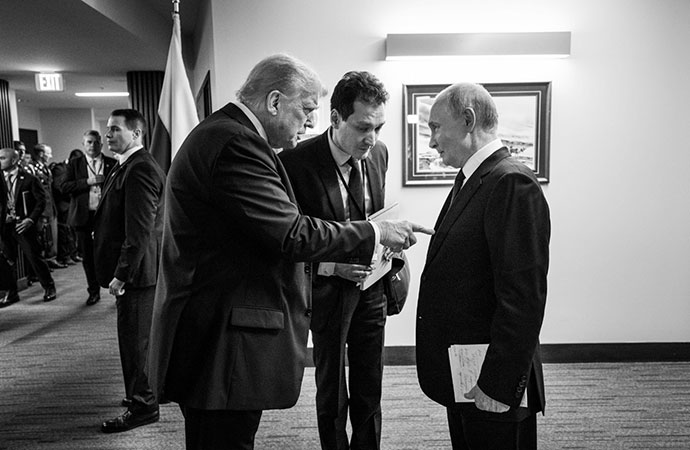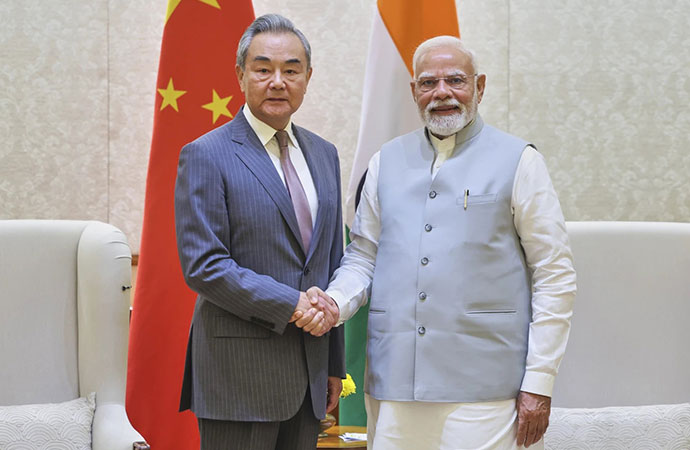Column

US President Donald Trump and Russia’s President Vladimir Putin. Photo: White House
Countries across the world should be worried about the implications of Russia's war of aggression on Ukraine. A small state was invaded by its larger hegemonic neighbor. Russia currently occupies 20% of Ukrainian territory, including the Crimean Peninsula which it annexed in 2014; and large parts of eastern and southern Ukraine. Russia's annexations have marked the breakdown of the Budapest Memorandum in which Moscow assured the international community of its commitment to the territorial integrity of post-Soviet states.
In UN General Assembly Resolution ES-11/4, one hundred and forty-three nations voted to declare Russia's annexation of eastern Ukraine in 2022 as illegal and invalid under international law. Bangladesh was among the nations which voted in support of this resolution against Russia's annexation of four Ukrainian oblasts. Appeasing and accepting Russia's invasion, occupation and annexation of parts of Ukraine would be akin to rewarding an aggressor and punishing a victim. It sets a dangerous precedent for international peace and security, including in regions far away from the Russo-Ukrainian frontline. It would undermine the principle of a just peace, stable borders and the notion of uti possidetis juris which is a cornerstone of the postwar international order that has developed since the creation of the United Nations.
In a twist of irony, the victim state has been accused by the aggressor state of fascism. Russia claims its "special military operation" in Ukraine is aimed at "denazification". Donald Trump's outreach to the Kremlin has led to pressure on the Ukrainians to give up territory as part of concessions to Moscow. This is an extremely dangerous threat to the basis of international rule of law, peace and security. As Martin Luther King Jr. said, "injustice anywhere is a threat to justice everywhere". Ukraine's territorial integrity must be non-negotiable. Russia must reaffirm its commitment to respecting the territorial integrity of all post-Soviet states.
The second Trump administration has prioritized an end to the Ukraine War. For President Trump, normalization with the Kremlin has been a key goal. America's rapprochement with Russia has resulted in a historic summit meeting in Alaska between the Russian President Vladimir Putin and President Trump. Alaska was once part of the Russian Empire before it was purchased by the United States in 1867. The meeting in Alaska sent ripples across the globe due to the evident bonhomie between Putin and Trump.
According to Chatham House, "US dialogue with Russian officials has, at a minimum, opened a path to a potential ceasefire and peace deal". Ukraine has resisted any terms of peace dictated by Russia which would involve a concession of Ukrainian territory, including Crimea and the eastern districts under Russian occupation. President Trump initially touted a ceasefire. After talks with Putin, Trump called for a peace deal to end the war instead of a ceasefire.
The Alaska summit was followed by an unprecedented gathering of the leaders of Ukraine, Britain, France, Germany, Italy, Finland, NATO and the European Union at the White House. The German chancellor Friedrich Merz held out hope for a ceasefire as a realistic option. The war in Ukraine is expected to rage for the longer term due to skepticism about the ability of Kyiv and Moscow to reach a peace deal. Trump telephoned Putin while European leaders were at the White House as part of efforts to promote a peace summit.
Rewarding Russia for invading a smaller neighbor gives the signal that might is right. Despots in other parts of the world may be tempted to undertake similar misadventures against neighboring countries. However, President Trump has pointed to his record of brokering peace talks in different parts of the world, including between India and Pakistan, Azerbaijan and Armenia, Rwanda and Congo, Kosovo and Serbia, and the Abraham Accords.
Trump's vision of the world is also one of great power collusion, instead of great power competition. Trump wants to work with China and Russia to manage the international order. Policymakers in Beijing and Moscow are enjoying the imperialist presidency in Washington.
Umran Chowdhury is Assistant Editor of the Dhaka Courier and a Research Associate at the Cosmos Foundation and Bay of Bengal Institute.

























Leave a Comment
Recent Posts
Religion and Politics: A Toxic ...
At Dhaka University, cafeteria workers have been told not to wear shor ...
Enayetullah Khan joins AsiaNet ...
AsiaNet’s annual board meeting and forum was held in Singapore, ...
In a New York minute
Many leaders back a UN call to address challenges to ..
Defaulted loans at Non-Bank Financial Institutions ( ..
How the late Zubeen Garg embodied cultural affinitie ..